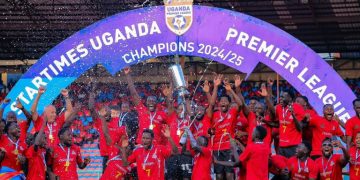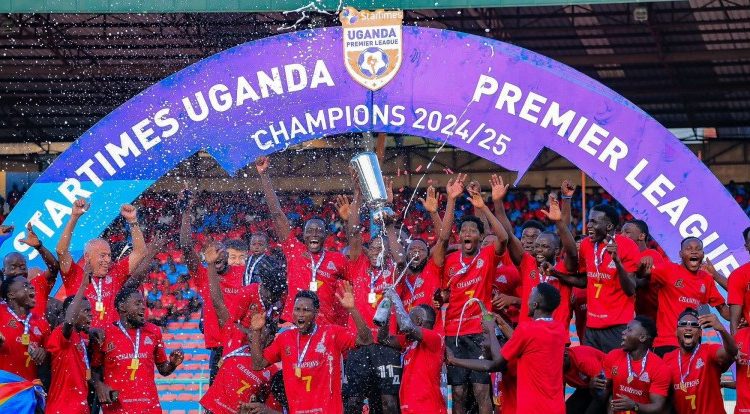Ugandan football is at a crossroads, but not because of vision or innovation, but rather because of the heavy hand of FUFA.
In a tense Serena Hotel meeting on Tuesday, the Federation forced through a sweeping overhaul of the Uganda Premier League (UPL) for the 2025/26 season.
Thirteen of the league’s 16 clubs voted “yes,” but the sight of Vipers SC, SC Villa, and NEC FC storming out in protest painted a clearer picture: these reforms are being rammed down the throats of Ugandan football, not built on consensus.
At the heart of the storm is FUFA’s new league format, a flashy-sounding, TV-friendly setup that will split the UPL into a conference-style structure mid-season, introduce playoff rounds, and compress fixtures into tight clusters to boost drama.
"FUFA came with something else. They want to dictate over all the issues. They want to intimidate which I can not accept," – Dr. Lawrence Mulindwa. #NBSportUpdates pic.twitter.com/3ZxRProSKA
— NBS Sport (@NBSportUg) September 9, 2025
It’s being sold as a bold modernisation plan meant to attract sponsors and media coverage, but beneath the gloss, this format threatens to fracture the competition, dilute fairness, and turn the league into a chaotic circus rather than a credible sporting contest.
Uganda’s football economy is fragile; clubs are underfunded, player welfare is poor, and infrastructure remains shaky.
Forcing a hyper-commercialised format in such an environment is like building a mansion on sand.
Instead of fixing foundational problems like poor refereeing standards, youth development, and club governance, FUFA has opted for a cosmetic overhaul that risks exhausting players, inflating costs for already cash-strapped clubs, and reducing football to spectacle over substance.
A Meeting That Felt More Like a Coup
Vipers president Dr. Lawrence Mulindwa did not mince his words after ‘leading’ the walkout, accusing FUFA of railroading clubs into accepting a pre-determined script.
His revelations that government-backed clubs were under “orders from the top” to support the reforms are deeply alarming. Football should be about sporting merit, not political alignment, yet FUFA reportedly went as far as branding dissenters as “government opposition.”
"Seven chairmen told us they don't support the reforms, but they were intimidated," – Vipers president, Dr. Lawrence Mulindwa. #NBSportUpdates #NBSportThePavilion pic.twitter.com/6uPoyOakew
— NBS Sport (@NBSportUg) September 9, 2025
If true, these are not just dirty politics, they are a warning sign of creeping authoritarianism in football administration. Clubs, especially private ones like Vipers, have invested blood and treasure in this league.
To dismiss their concerns and coerce votes through political pressure is a betrayal of trust.
Magogo’s Billions: Smoke and Mirrors?
FUFA president Moses Magogo’s defence of the reforms leans heavily on a supposed Sh3.4 billion investment package, promising everything from marketing boosts to locker-room bonuses.
Yet, crucial details remain vague: Where exactly is this money coming from? What mechanisms will ensure transparency? How sustainable is it beyond a flashy launch year?
SC Villa president, Hajji Omar Mandela furious and asking "why were you calling and threatening people?
FUFA 3rd Vice President, Florence Nakiwala Kiyingi interjects…
Stay tuned.#NBSportUpdates #NBSportThePavilion pic.twitter.com/E9G1Rs5BjW
— NBS Sport (@NBSportUg) September 9, 2025
Money alone does not build a strong league. If these funds are not tied to long-term structural reforms, they risk becoming another headline-grabbing stunt. Uganda doesn’t need a “shiny product” for TV cameras, it needs a credible league built on solid governance, fair play, and genuine stakeholder involvement.
The Risks of a Gimmick Format
The new UPL structure, marketed as progressive, mirrors trends from wealthier leagues but ignores Uganda’s unique context. Splitting the league on short notice into playoff-style mini-tournaments might spike short-term excitement, but it undermines the traditional league’s integrity, where consistency and endurance crown champions.
This format also increases fixture congestion, raising the risk of injuries and travel costs for clubs already struggling to pay player salaries.
Instead of elevating competition, this approach risks reducing the UPL to a spectacle of survival, where gimmicks replace development.
Football purists, players, and even fans may find themselves alienated from a league that feels more like a made-for-TV drama than a genuine competition.
Alienating Clubs, Weakening Football’s Fabric
The walkout by three major clubs is not a trivial protest, it is a damning indictment of FUFA’s approach. Villa and Vipers, historical giants of Ugandan football, and NEC, a rising force, have all rejected this vision. Their absence from this “consensus” speaks volumes.
"Football must be independent. We're not fighting, we had only come with proposals," – Dr. Lawrence Mulindwa, Vipers president. #NBSportThePavilion #NBSportUpdates pic.twitter.com/u7rMfiev9I
— NBS Sport (@NBSportUg) September 9, 2025
Instead of building bridges, FUFA is burning them. The federation’s top-down control threatens to suffocate the league’s growth, stifle private investment, and reduce clubs to pawns. If FUFA cannot unite its most committed stakeholders, how does it expect to sell this league to fans, broadcasters, and sponsors?
Uganda Needs Real Reform, Not Political Manoeuvres
There’s no question that Ugandan football needs reform. The UPL has long been plagued by financial instability, governance scandals, and underdevelopment. But real reform is about inclusion, dialogue, and sustainable planning, not quick fixes or political manoeuvring.
FUFA’s heavy-handed approach has turned what could have been a moment of progress into a bitter power struggle. Instead of elevating football, these reforms threaten to hollow it out, replacing sporting purity with gimmicks and sidelining the voices of those who’ve invested in the game for decades.
For all the talk of billions and modernisation, Ugandan football’s soul is being gambled away. Without transparency, unity, and respect for clubs’ autonomy, this “new era” may be remembered not as a rebirth but as the moment football lost its way.





























